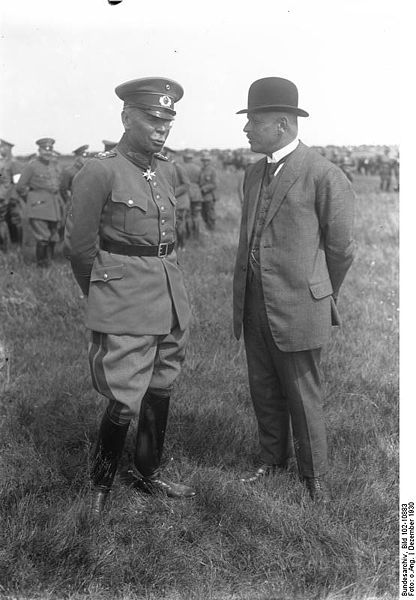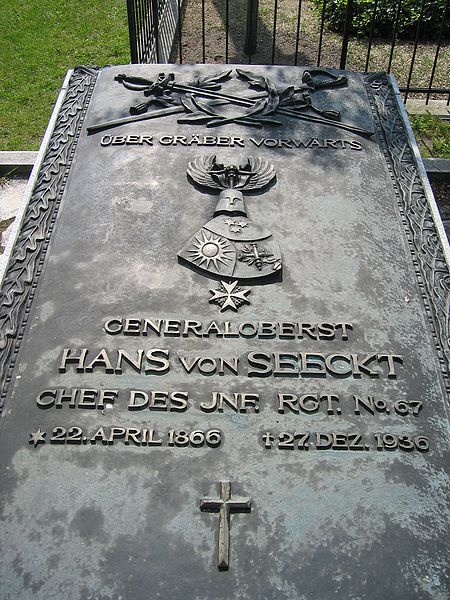<Back to Index>
- Physicist Julius Robert Oppenheimer, 1904
- Novelist Vladimir Vladimirovich Nabokov, 1899
- General of Reichswehr Johannes Friedrich "Hans" von Seeckt, 1866
PAGE SPONSOR


Johannes Friedrich "Hans" von Seeckt (22 April 1866 - 27 December 1936) was a German military officer noted for his organization of the German Army (Reichswehr) during the Weimar Republic.
Seeckt was born in Schleswig on April 22, 1866 to an old Pomeranian family, which had been ennobled in the eighteenth century. Though the family had lost its estates, Seeckt was "a thorough-going aristocrat" and his father was an important general within the German Army, finishing his career as military governor of Posen. Seeckt followed his father into military service, joining the Army in 1885 at the age of 18. He served in the elite Kaiser Alexander Guard Grenadiers, then joined the Prussian General Staff in 1897.
At the outbreak of the First World War, Seeckt held the rank of colonel and
served as chief of staff in the German III Army Corps. Seeckt marched
with the Corps in the German offensive, and "distinguished himself" in
fighting near Soissons, then in March 1915, he became chief of staff to General August von Mackensen of the German Eleventh Army. With the Eleventh Army, Seeckt fought in the Gorlice – Tarnów Offensive, where he was credited with engineering Mackensen's breakthrough, and received the Pour le Mérite, Prussia's highest military honor. In June 1915, Seeckt was promoted to the rank of Generalmajor, and in September he followed von Mackensen to Temesvar, where he joined the campaign against Serbia. In June 1916 he became chief of staff for the Austro - Hungarian Seventh Army in Galicia.
After the end of the war and the dissolution of the old imperial army it fell to Seeckt to organize the new Reichswehr within the strict restrictions imposed by the Treaty of Versailles. He successfully laid the basis for a strong Reichswehr and disguised the new leadership, the forbidden General Staff, under the name the Truppenamt, or Troop Office. He is also known for his hostile attitude towards the Second Polish Republic, and for seeking an alliance with the Soviet Union against Poland. After seeing encouraging signs from the newly established War Commissar's Office of Leon Trotsky, Seeckt sent out a secret staff to conduct a military alliance with the Soviets, unbeknownst to the Weimar government.
After the Allies sent the German government a list of "war criminals" to be tried Seeckt called a conference of Staff Officers and departmental heads on 9 February, 1920 and said to them that if the German government refused or was unable to reject the Allied demands, the Reichswehr must oppose this by all means even if this meant the reopening of hostilities. He further said that if the Allies invaded Germany — which he believed they would not — then the German army in the West should retire behind the Weser and the Elbe, as this was where defensive positions had already been built. In the East, German troops would invade Poland and attempt to establish contacts with the Soviet Union, wherein they would both march against France and Britain. He added that German war material would now no longer be sold or destroyed and that the army should be reduced on paper only. An Interior Minister of Prussia, Albert Grzesinski, wrote that members of Seeckt's staff said that Seeckt desired a military dictatorship, perhaps headed by Gustav Noske.
Seeckt's role during the Kapp Putsch of March 1920 remains uncertain; he refused to either actively put down the rebellion or co-operate with it. His remark to the leaders of the republic, that "Reichswehr do not fire on Reichswehr", was controversial.
From 1920 to 1926 Seeckt held the position of Chef der Heeresleitung — in fact if not in name commander of the army of the new Weimar Republic, the Reichswehr. In working to build a non-political professional army within and without the confines of the Treaty of Versailles, Seeckt advanced the concept of the army as a state-within-a-state. He was an admirer of the British concept of a small, highly trained regular army within which political activity was forbidden. This matched the conditions of the Versailles Treaty which were aimed at creating a long term professional army with a ceiling of 100,000 volunteers and without significant reserves - a force which would not be able to challenge the much larger French Army. Seeckt was a monarchist by personal inclination who encouraged the retention of traditional links with the old Imperial Army. With this purpose he designated individual companies and squadrons of the new Reichswehr as the direct successors of particular regiments of the emperor's army.
After Seeckt had met Adolf Hitler for the first time on 11 March, 1923 he wrote: "We were one in our aim; only our paths were different". However he firmly resisted Hitler's Putsch on November 8-9, 1923, insisting that the Bavarian Division of the Reischswehr remain loyal to the Republic. He strongly opposed the Locarno Treaties which he viewed as appeasement of France and was sceptical of German membership of the League of Nations because he believed it was selling out to the West Germany's connections with Russia.
Seeckt was eventually forced to resign on 9 October, 1926 after permitting Prince Wilhelm, the grandson of the former emperor to attend army manoeuvres in the uniform of the old imperial First Foot Guards without first seeking government approval.
While running the military, Von Seeckt only allowed skilled men to be in the 100,000 man army. He locked them into a mandatory 12 years of confirmed military service with full board and pay, allowing for a form of stability that rarely existed in the midst of massive economic depression of Germany. He gained the loyalty of his men by paying them six times the amount of a French army soldier. Von Seeckt made the training standards of the Reichswehr the toughest in the world. Von Seeckt trained them in anti-air and anti-tank battles by creating wooden weapons and staging mock battles under the guise of training the soldiers for reintroduction into civilian life. Von Seeckt disciplined this small army much differently than past German armies. Rather than beat or shoot soldiers for infractions, Von Seeckt forced minor offenders to spend off-hour duties lying under a bed and singing old Lutheran hymns. The Chief also had his men taught in seemingly useless topics like horse anatomy and the art of beekeeping to allow them to be citizens with skills as well as military support crews.
Seeckt has been critiziced for his training the Reichswehr to fight wars in the distant future rather than training them for possible wars in the present. Seeckt saw the Reichswehr as detached from politics, neither promoting or denying the legitimacy of the Weimar Republic. Seeckt saw the Reichswehr as a way to train the army for the future, not as a means to protect Germany while it was under threat of invasion by Czechoslovakia and Poland. As a result little effort was prepared for war plans should either nation have invaded; Seeckt preferred to train his armies to fight in a mechanized environment that could not exist until Germany rearmed. Seeckt's logic was that eventually Germany would violate Versaille and rearm and he prepared for that, and although that proved correct, he endangered Germany at the time by not preparing for contigencies in the present. After Seeckt left the Reicshwehr in 1926, far more effort was paid to preparing the Reichswehr in fighting the potential enemies in the present using equipment already available to the Reichswehr.
From 1930 - 32 Seeckt sat in the Reichstag as a member of the DVP, after failing to be adopted as a candidate for the Centre Party. In the presidential election of 1932 he wrote to his sister, urging her to vote for Hitler. From 1934 - 35 he served as an adviser to Chiang Kai-shek. But on returning to Germany from China he became disillusioned with Hitler.